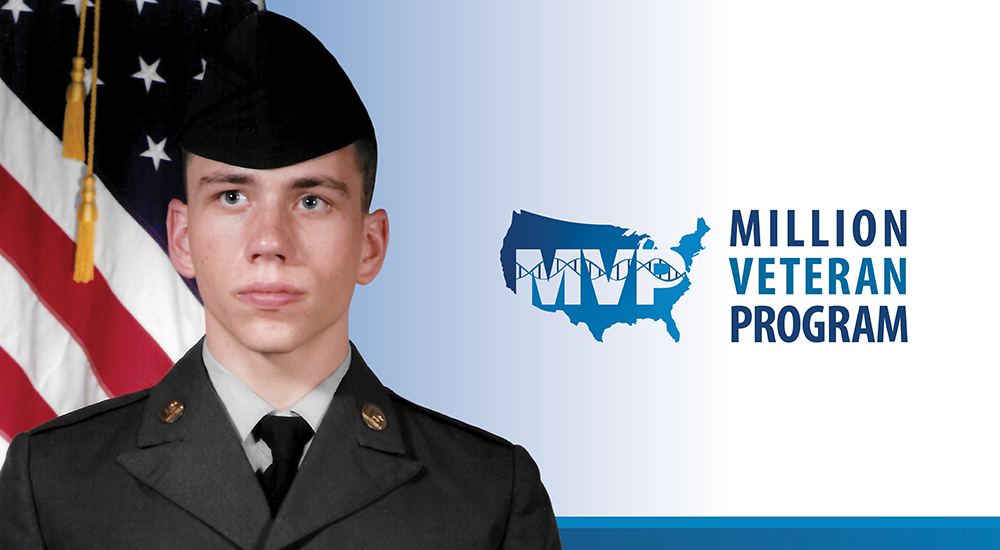Dr. Mark Logue is a statistician and researcher whose work with VA’s Million Veteran Program focuses on Alzheimer’s and dementia.
As he arrives to work each morning, Logue is reminded why he’s chosen to research genetics at VA, looking for factors that influence health risks for Veterans. “When I walk through the lobby I see people waiting for treatments and I know we’re helping Veterans just like them,” he said.
Logue joined the Army Reserve to help pay for college. His studies at the University of Oregon were interrupted briefly when he deployed to Germany to work in Medical Supply in support of Operation Desert Storm. After graduation, he attended the University of Iowa where he worked on a Ph.D. in Statistics and researched the genetics of mental health and panic disorder. That led him to Boston University where he began researching Alzheimer’s disease.
He began a collaboration to study posttraumatic stress disorder (PTSD) genetics with colleagues at the National Center for PTSD, Behavioral Sciences Division, where he now works as a full-time VA statistician and genetics researcher.
An important discovery
Given his background as both a researcher and Veteran, Logue (pictured above) wanted to search for potential links between various aspects of brain health, including PTSD, traumatic brain injury (TBI), Alzheimer’s disease and other related dementias (ADRD). “Using the Million Veterans Program (MVP) data and making sure that the results are widely distributed helps ensure that my genetic findings will benefit Veterans,” he added.
Past research has shown that certain genes affect the risk of Alzheimer’s disease later in life and that ADRD risk is higher for those who have had PTSD or a TBI. Logue set out to answer an important question: Do PTSD and TBI interact with Alzheimer’s disease genes to lead to even more cases of ADRD?
The findings were clear: PTSD and TBI do increase a Veteran’s risk for developing ADRD, and these effects were higher in those with high-risk Alzheimer’s genes.
What does this research mean for Veterans?
Logue’s research already has positive implications for Veteran health. The Department of Defense and the Veteran’s Brain Injury Center estimate that 22% of all Operation Enduring Freedom/Operation Iraqi Freedom combat wounds are brain injuries. Better screening and identification of injuries like TBI may lead to earlier detection and better outcomes for Veterans at risk of ADRD.
His research also opens up the potential for new discoveries, like finding new genes linked to Alzheimer’s disease risk that could help researchers and doctors develop better treatments and preventions. Someday, researchers may even be able to identify people with a high risk of Alzheimer’s disease long before symptoms begin and help prevent the neurological effects of Alzheimer’s.
Veterans helping Veterans
As more Veterans join MVP, the potential for exciting discoveries and ultimately better Veteran health care grows. “The diversity of MVP is one of the big strengths of the study. Studying data from diverse participants leads to the identification of new risk variants and to genetic discoveries that benefit everyone,” Logue said.
As a Veteran, Logue understands the power of this research and says he appreciates the opportunity to support his fellow Veterans. “A lot of us have family members or friends who have been diagnosed with Alzheimer’s disease. Many of us know someone experiencing PTSD or living with the effects of a TBI. The research community is really excited about the data that is coming out of MVP. I’m grateful I can be involved and I’m motivated to keep doing research for the Veterans who made it possible,” he said.
Join over 950,000 Veterans in VA’s Million Veteran Program
Each Veteran that joins MVP has a positive impact on the research and discoveries made by researchers like Logue. MVP is 50,000 Veterans away from reaching its goal of enrolling one million Veterans, and this is just the beginning. In addition to brain health, MVP is studying dozens of health conditions that affect Veterans, including:
- Cancer
- Diabetes
- Heart health
- Tinnitus
Join the Million Veteran program today at www.mvp.va.gov or call 866-441-6075 to make an appointment at a participating VA facility. You don’t need to receive your care at VA to participate.
Topics in this story
More Stories
Study underscores important role COVID vaccination can have in protecting Veterans from infection and reducing long-term health consequences
Columbia VA’s robotic surgery teams completed their 800th robotic surgery and are on schedule to hit 1,000 by the end of the year.
In a decentralized clinical trial, Veterans can participate from their own homes or local VA instead of having to travel to a research site.






